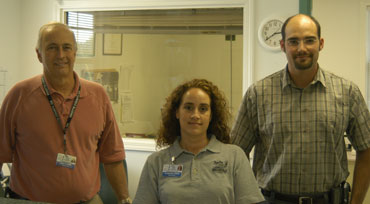Search the ArchivesNavigationContact InformationThe Citizen Newspapers For Advertising Information Email us your news! For technical difficulties |
The dog days of summerWed, 07/25/2007 - 9:47am
By: Andrew Widener
 Fred Sisson, Chris Porter, and Miguel Abi-Hassan, in the lobby of the Fayette County Animal Shelter, have dozens of years of combined experience with animal welfare. Photo/Special.
Fred Sisson, Chris Porter, and Miguel Abi-Hassan, in the lobby of the Fayette County Animal Shelter, have dozens of years of combined experience with animal welfare. Photo/Special.
Helping animals find a home When he was growing up in Venezuela, people used to say that Miguel Abi-Hassan was born with a kitten in his hands. Now he likes all animals, which is certainly a prerequisite for the job he has had the last three years. Abi-Hassan, having worked in animal welfare in Venezuela, Ohio, and Florida, is the Director of Animal Control in Fayette County. His office is at the Animal Shelter on Ga. Highway 74 in Peachtree City, where his lifetime of experience with animals and degrees in animal welfare and industrial psychology are put to good use. “Fayette County is just an absolutely wonderful place to work,” Abi-Hassan said, sitting at his desk as Andy, the ten-year-old Shetland and “shelter spokesdog” who has conducted 78 children’s tours lay on the floor nearby. “A lot of counties wouldn’t allow the resources that we have here.” Several years ago Fayette County placed Animal Control under the purview of public safety, which includes fire and emergency services. Abi-Hassan praised this move and deplored the dismal perception some counties have created by organizing their animal welfare departments within the prison system. Fortunately for the strays of Fayette County the community is “very receptive toward pet issues,” said Abi-Hassan. This commitment is buttressed by three full-time officers, a part-time kennel attendant, and Fred Sisson, the supervisor, whose four years at the animal shelter were preceded by 25 years at the Atlanta Humane Society. It is impossible to diminish the anguish that often accompanies what must happen at the Animal Shelter, but Fayette County has managed to condition these circumstances with cleanliness, respect, and professionalism. Two years ago the policy and procedure manual was updated to provide for aesthetic improvements of the animals, to aid their chances of adoption, and of the shelter, the appeal of which can influence a potential adopter. Walking through the kennel barely an odor offends the senses, attributable partly to the flooring: a $30,000 production of seamless, antimicrobial, easily-cleaned green rubbery material. The high compression fan in the room housing cats, funded with a grant from the Humane Society, circulates air away from the cages, preventing airborne infections, of which one type, upper-respiratory infection, is the leading sickness in kenneled cats. The humans are tended to also; Abi-Hassan is certified to deal with compassion fatigue, the tortuous toll inflicted by working with diseased and abused animals. The fastidiousness of the staff has led to an adoption rate of healthy animals at 80 percent, one of the top three in the Atlanta area. “Our simple goal here is to adopt one more animal tomorrow than we did today,” Abi-Hassan said. Captain Pete Nelms, a cat person with a Maltese at home, noted, “I think he’s really done a great job looking at all the different things to try and improve adoption services.” In addition to cleaner kennels, the staff has been trained in adoption counseling, visitors are permitted to bring their pets from home to gauge their compatibility with potential adoptions, and each new pet owner leaves the shelter with a bundle of veterinary discounts and training literature. The shelter’s mission of “education, legislation, sterilization” mandates, in addition to teaching pet owners proper techniques and behavior and enforcing animal control ordinances, the spaying or neutering of all animals that leave the shelter. The county subsidizes sterilization for those who request it, and the Humane Society may pay for it as well, an alliance between the public and private sectors that indicates the gravity of this problem. In these dog days of summer there are more strays being reported and picked up, fewer unoccupied cages, and a euthanasia rate that, while “not out of control” according to Abi-Hassan, is ruefully high. The ghastly proportion of homeless animals to humans (seven to one) has come to bear on Fayette County. So have “kitten season,” the warm weather months that engender wild breeding and have brought 40 kittens to the shelter, and the parchment of the terrain, which sends animals ranging about in search of food and water. Kelly Vick, a denizen of Fayetteville and former volunteer at the local Humane Society, visited the shelter recently to adopt a cat. She said she had never seen it as crowded and, after adopting one kitten, returned later to pick up its littermates to foster until they are found a home. Despite Abi-Hassan’s humanitarian approach, the pall of euthanasia stalks the animals whose stay grows long at the shelter. Adoptions are always welcome and visitors accomodated. The Fayette County Animal Shelter is located at 1262 Ga. Hwy. 74 South in Peachtree City. The hours of operation are 8 a.m. to 5 p.m. from Monday to Friday and 11 a.m. to 2 p.m. on Saturday. The telephone number is 770-631-7210. login to post comments
|